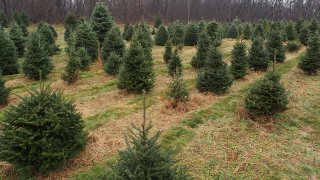
Just a few days into December, John Hamill has received a number of queries from worried callers: Does he still have Christmas trees available at his Roanoke farm?
Their concern is prompted by a national Christmas tree shortage, a consequence of the economic downturn of the late 2000s that's being felt a decade later. But industry experts say holiday revelers in search of a tree should be able to find one.
"I tell them it's not serious enough for panic," Hamill said.
Robert O'Keeffe, a board member of the Virginia Christmas Tree Growers Association, said the recession is to blame for the nationwide shortage. Farmers planted fewer trees when the economy was weak. O'Keeffe said the industry is now in a "game of catch-up."
And given that it takes 10 to 12 years for a Fraser fir — "Cadillac of the Christmas trees," O'Keeffe said — to grow up to 6 or 8 feet in height, the shortage is likely to continue beyond 2019.
"It's going to be like this for a few years," he said.
Prices have increased some, O'Keeffe said, but more to keep up with inflation and labor costs than in response to the shortage.
Local
Washington, D.C., Maryland and Virginia local news, events and information
There are more than 500 Christmas tree farms in Virginia, with annual sales of about $10 million, according to the Virginia Department of Agriculture and Consumer Services. Since Thanksgiving, tree farms throughout the region have been flooded with customers.
Business was particularly good at Hamill's operation on Black Friday, probably a record. He said the short window between Thanksgiving and Christmas this year has created a more frenzied period of shopping.
Hamill said he has an adequate supply of trees, as he continued planting regularly during the recession. He plants between 1,000 and 2,000 seedlings annually. But he can tell others are grappling with the shortage; though his business is strictly local retail, Hamill got numerous calls from wholesalers looking to buy his trees.
Despite the shortage, Hamill said he's more concerned about Christmas tree farmers leaving the business with no successor to take their place, another challenge the industry faces.
For the first time in about 40 years, Clark's Hilltop Nursery in Floyd is not selling Christmas trees directly to the public. Bobby Clark said the family decided to exclusively go the wholesale route this year.
"It was easier to sell a tractor-trailer load to a customer in Indiana, so to speak, than us one tree at a time to the public," Clark said.
Historically, the nursery has done both wholesale and retail business. Generations of families have come to the farm to select and cut down their own trees. But this year, Clark said there weren't enough trees to support both.
Clark said they haven't planted any new trees since the recession, when there was an oversupply of trees and the economy crashed.
"We just didn't have the money to purchase seedlings and resupply for the future," he said.
With recession-era trends and more farms going out of business, Clark said people in the Christmas tree industry should have seen this shortage coming.
O'Keeffe, with the state's Christmas tree association, owns Rifton Farm & Nursery in Pilot. Between wholesale and retail, he expects to sell about 1,000 trees this year. The longtime Christmas tree farmer — O'Keeffe planted his first trees in 1975 — said he'd never seen a shortage like this year's.
But he's confident he'll have enough trees for choose-and-cut customers and was able to meet the demands of his existing wholesale customers _ although he wasn't able to take on any new ones. He received calls from wholesalers as far away as Louisiana in search of trees.
Some Christmas tree farms may close earlier than usual if they run out of supply. O'Keeffe said one association member planned to close up shop after the first week of December.
Still, O'Keeffe said people who want Christmas trees should be able to get them. But they may have to make some compromises on size or variety.
"We just try and tell people shop early and maybe give another tree a chance that they normally wouldn't buy," he said.



